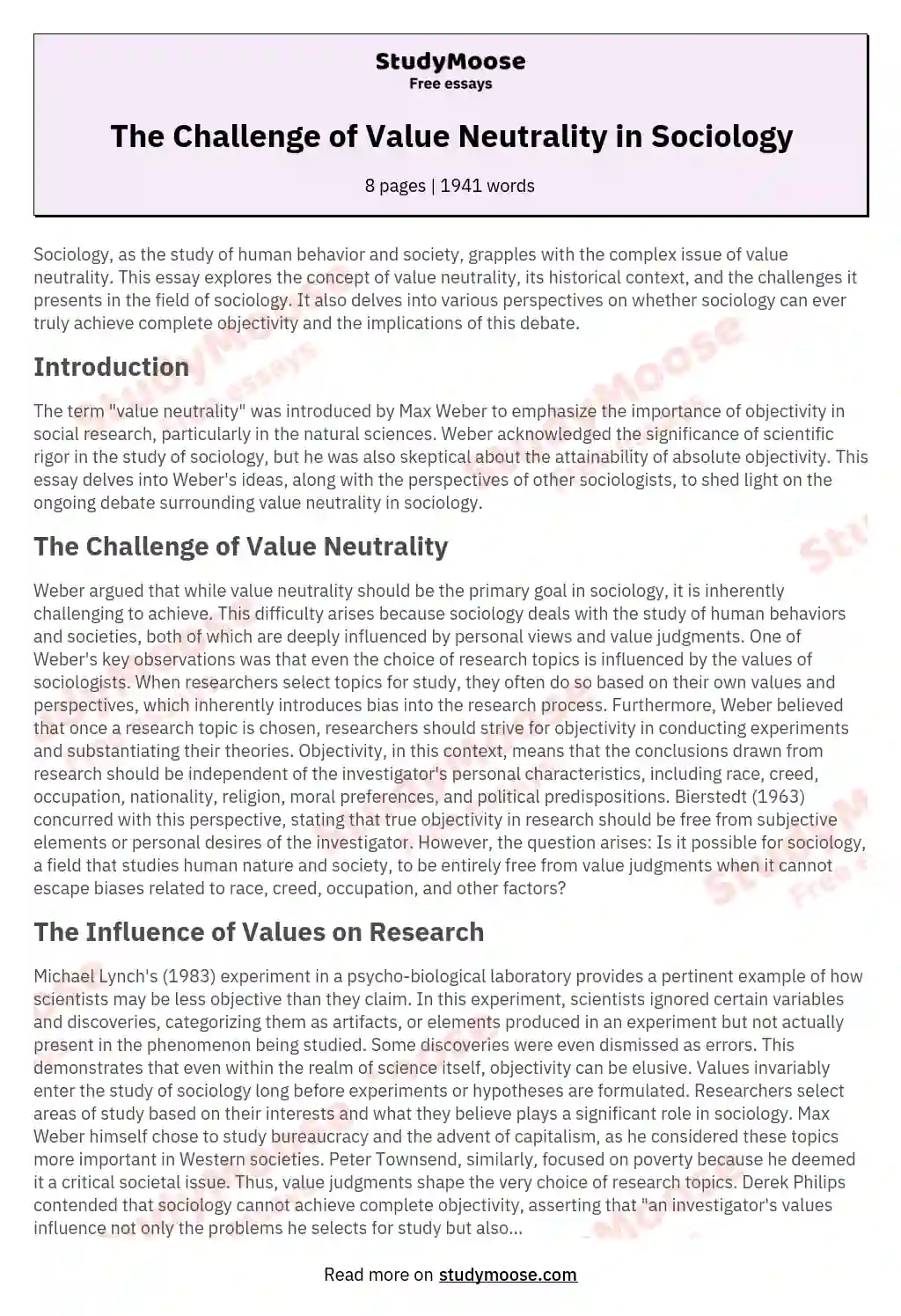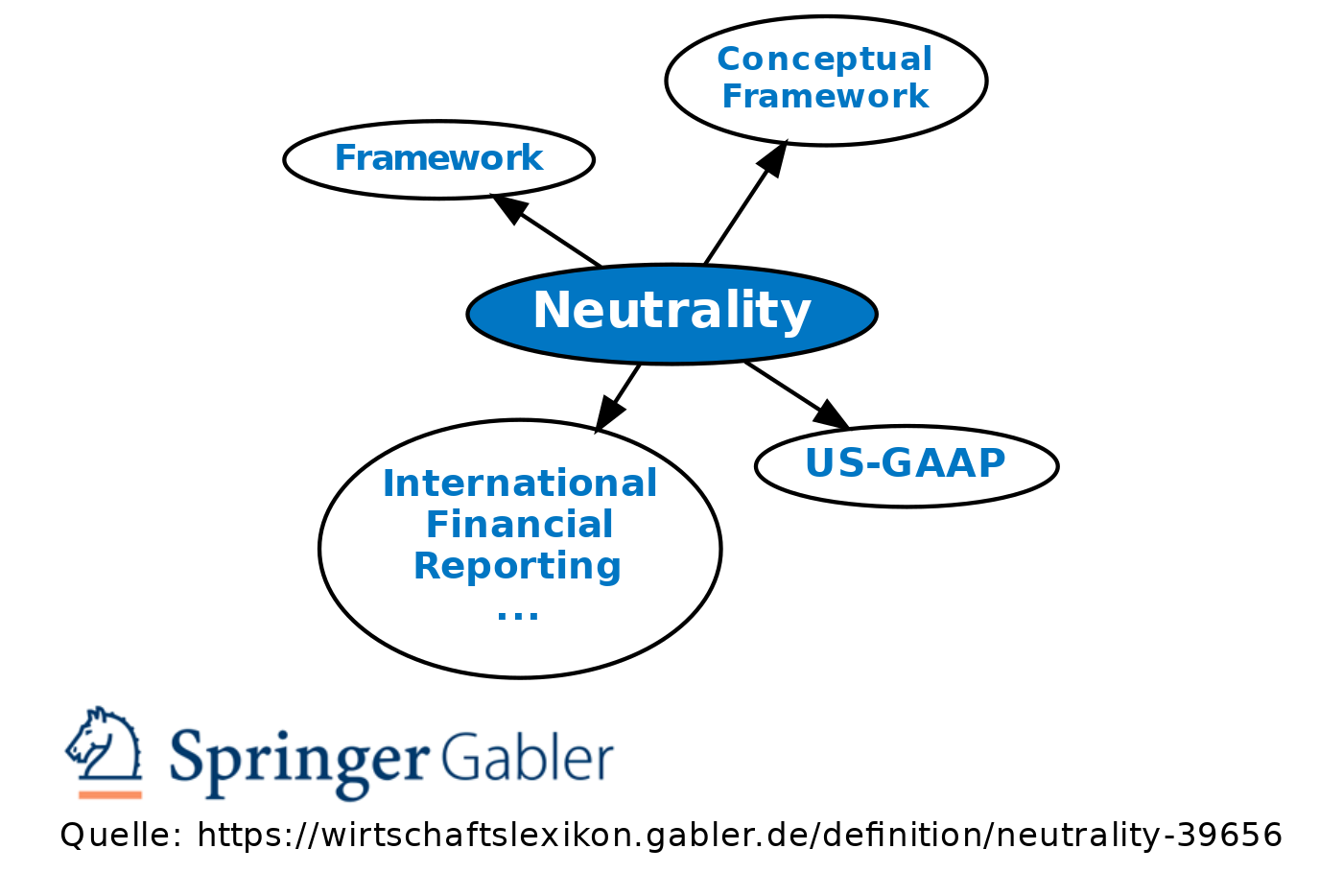Imagine a sociologist studying the impact of gentrification on a historically marginalized community. They observe rising property values, new businesses catering to a wealthier demographic, and the displacement of long-time residents. This complex situation raises questions: Is gentrification inherently “good” or “bad”? Can the sociologist remain truly neutral in their analysis, or are their own values and experiences inevitably influencing their interpretation? This is the essence of the ongoing debate surrounding value neutrality in sociology.

Image: studymoose.com
Value neutrality is a fundamental principle in the field of sociology, advocating for researchers to minimize the influence of their personal biases and beliefs in their observations and analyses. It’s a philosophical stance arguing that sociologists should strive to present a factual and objective account of social phenomena, avoiding subjective judgments and moral pronouncements. While value neutrality is considered an ideal, it remains a point of contention within the discipline, prompting questions about its feasibility and the potential consequences of adhering to it.
The Origins and Evolution of Value Neutrality
Max Weber: A Pivotal Figure
The concept of value neutrality is deeply rooted in the work of Max Weber, a prominent German sociologist who lived at the turn of the 20th century. In response to the burgeoning social sciences of his time, Weber argued that sociologists should strive for objectivity in their research, separating their personal values from their scientific analysis. This notion was crucial for establishing sociology as a legitimate academic discipline, free from political or ideological influence.
Weber believed that while sociologists inevitably bring their own perspectives to their work, they could strive to minimize the impact of their values through rigorous methodologies, careful analysis, and transparent communication of their findings. He envisioned the sociologist as a detached observer, impartially observing and interpreting social phenomena, much like a natural scientist studying the physical world.
Challenges and Debates
Despite Weber’s profound influence, the concept of value neutrality has been continuously challenged and debated over the years. Critics argue that complete objectivity is unattainable, given that sociologists are inherently products of their social environments and possess their own unique perspectives, beliefs, and experiences. They contend that any attempt to divorce oneself from these influences inevitably compromises neutrality.
Furthermore, the very act of choosing which social phenomena to study and how to frame research questions can be influenced by values. The selection of a specific research topic, the development of research methods, and even the interpretation of data often carry implicit value judgments, making it difficult to claim absolute neutrality.

Image: fity.club
Value Neutrality in Practice: Ethical Considerations and Challenges
Balancing Objectivity and Advocacy
Sociological research often focuses on social issues that directly impact individuals and communities, such as inequality, discrimination, and social injustice. While striving for objectivity, it becomes ethically challenging for sociologists to remain completely detached from the human consequences of the social phenomena they study. This raises questions about the role of the sociologist: Are they simply observers, or do they have a responsibility to advocate for social change based on their research findings?
Some argue that sociologists have a moral obligation to speak out against injustice and use their research to inform and empower marginalized groups. Others maintain that advocacy can compromise neutrality, blurring the lines between research and activism. This dilemma highlights the complex relationship between value neutrality and the ethical considerations inherent in sociological work.
The Impact of Social Context
Sociological research is inherently influenced by the social context in which it takes place. The historical, cultural, and political environment shapes the questions sociologists ask, the methods they employ, and the interpretations they draw from their findings. This inherent contextualization poses a challenge to achieving absolute value neutrality, as it underscores the embeddedness of research within a specific social landscape.
The rise of social media, online communities, and the availability of vast datasets have also transformed the landscape of sociological research. These new sources of data and the ways in which they are accessed and analyzed raise further questions about value neutrality in the digital age. While providing unprecedented opportunities for data collection and analysis, these technologies can also introduce new biases, depending on how they are used and interpreted.
Navigating Value Neutrality in the 21st Century
Transparency and Reflexivity
Recognizing the limitations of achieving complete neutrality, many contemporary sociologists advocate for transparency and reflexivity in research. This involves acknowledging their own biases, the potential influences on their work, and the limitations of their findings. By openly discussing these factors, sociologists can promote a more transparent and critical approach to research.
Engaging with Diverse Perspectives
Incorporating diverse perspectives and engaging with multiple voices is crucial for fostering a more comprehensive and nuanced understanding of social phenomena. This approach involves actively seeking out different viewpoints, engaging with diverse communities, and acknowledging the limitations of a single perspective. By embracing the richness and complexity of social life, sociologists can strive for a more inclusive and representative analysis.
Activism and Advocacy: A Potential Role for Sociologists?
While neutrality remains a crucial principle, some sociologists argue that advocacy for social justice can complement their research efforts. By engaging in public discourse, collaborating with community organizations, and contributing to policy discussions, sociologists can bridge the gap between research and action.
Tips for Students and Aspiring Sociologists
Be Mindful of Your Biases
Recognize that your personal values, beliefs, and experiences inevitably shape your perspective. Reflect on these influences, and strive to be aware of how they may impact your research interpretations.
Embrace Diverse Perspectives
Actively seek out diverse viewpoints, engage with different theoretical perspectives, and consider the potential biases within your research methods.
Practice Transparency
Clearly articulate your research questions, the ethical considerations involved, and the limitations of your findings. Acknowledge your own biases and the potential influences on your interpretations.
Engage with Social Issues
Don’t shy away from exploring complex social issues. Use your sociological knowledge to contribute to public discourse, engage with communities, and promote social change.
FAQ: Value Neutrality in Sociology
Q: Is complete value neutrality possible in sociological research?
A: It’s a widely debated topic. While complete objectivity is unlikely, striving for transparency, reflexivity, and multiple perspectives can minimize the impact of personal biases.
Q: How can I identify potential biases in my research?
A: Reflect on your own values and experiences, examine the questions you’re asking, the methods you’re using, and the interpretations you’re drawing. Seek feedback from colleagues and engage with diverse perspectives.
Q: Shouldn’t sociologists focus solely on objective research, leaving social activism to others?
A: There’s no simple answer. While neutrality is important, some believe sociologists have a responsibility to use their knowledge to contribute to social justice and empower marginalized groups.
Q: What are some examples of how values can influence sociological research?
A: The choice of research topics, the framing of research questions, the selection of research methods, and even the interpretation of data can all be influenced by values.
Value Neutrality In Sociology
Conclusion
While the goal of value neutrality remains an aspiration in sociology, it’s a principle that encourages critical thinking, reflexivity, and a commitment to transparency in research. By acknowledging the limits of objectivity and actively incorporating diverse perspectives, sociologists can strive for more inclusive and insightful analyses of social phenomena. This approach fosters a deeper understanding of the complexities of the human experience and allows for a more meaningful engagement with social issues.
Are you interested in exploring the ongoing debate surrounding value neutrality in sociology? Share your thoughts in the comments below!






